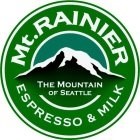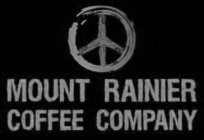IN THIS ISSUE
TRADEMARK BOARD RAINS ON APPLICATION FOR MT. RAINIER MARK
PIZZA PETITIONER FAILS AGAIN TO DELIVER CANCELLATION
TRADEMARK BOARD RAINS ON APPLICATION FOR MT. RAINIER MARK
In a case involving claims of confusion and misdescriptiveness, the U.S. Trademark Trial and Appeal Board (TTAB) affirmed the Examining Attorney’s refusal to register the trademark MT. RAINIER THE MOUNTAIN OF SEATTLE ESPRESSO & MILK and Design (Color). In re Morinaga Nyugyo Kabushiki Kaisha, Serial No. 86338392 (September 8, 2016) [precedential].
The Japanese company Morinaga Nyugyo Kabushiki Kaisha trading as Morinaga Milk Industry Co., Ltd. (Morinaga) applied to register the mark for “milk beverages containing espresso coffee and milk; milk products containing espresso coffee and milk, excluding ice cream, ice milk and frozen yogurt,” in International Class 29, and “espresso coffee containing milk; and sandwiches flavored with espresso coffee and milk,” in International Class 30. The Examining Attorney cited against the application two registrations owned by Mount Rainier Coffee Company (MRCC) of Puyallup, Washington: No. 4119865 for MOUNT RAINIER COFFEE COMPANY and No. 4225177 for MOUNT RAINIER COFFEE COMPANY and Design, both for use with “coffee,” in International Class 30.
Section 2(d) of the Trademark Action, 15 U.S.C. § 1052(d), prohibits the registration of a mark that is likely to be confused with a mark already registered. The TTAB analyzed the likelihood-of-confusion issue under the factors laid out in the leading case of In re E.I. DuPont DeNemours & Co., 476 F.2d 1357 (CCPA 1973). Applying those factors, the TTAB first found that Morinaga’s goods were identical or very closely related to those of MRCC. The TTAB then found that because the word mark MOUNT RAINIER COFFEE COMPANY is closer in appearance to Morinaga’s mark than MOUNT RAINIER COFFEE COMPANY and Design, the TTAB could base its decision on the word mark alone.
The TTAB found that Morinaga’s mark is “significantly similar” in appearance to the word mark MOUNT RAINIER COFFEE COMPANY. MT. RAINIER is essentially identical to MOUNT RAINIER, the TTAB said, and the other words in each mark do not serve to distinguish the marks, either because ESPRESSO & MILK, and COFFEE COMPANY are descriptive or generic or because the less-prominent words THE MOUNTAIN OF SEATTLE and the mountain design reinforce the impression made by the words MT. RAINIER.
The TTAB acknowledged that “[t]he marks are obviously not identical, and would differ somewhat in sound if vocalized in their entirety.” But the TTAB concluded that “[u]pon consideration of both marks in their entireties, [it found] that they are substantially similar in appearance, sound, meaning, and commercial impression.”
Noting that MRCC’s word mark is registered on the Supplemental Register, Morinaga argued that “the scope of protection for a descriptive mark has been limited to the subsequent use and registration of the ‘substantially identical’ mark for ‘substantially similar’ goods” (citing In re Hunke & Jochheim, 185 USPQ 188 (TTAB 1975). The TTAB rejected that argument, saying that Hunke & Jochheim was decided before the appellate cases of In re Research & Trading Corp., 793 F.2d 1276 (Fed. Cir. 1986), and In re Clorox Co., 578 F.2d 305 (CCPA 1978), which support citing registrations on the Supplemental Register against applications for confusingly similar marks. The TTAB stated flatly that “there is no categorical rule” that the citation of registrations on the Supplemental Register is limited to substantially identical marks for substantially similar goods or that a different test for confusion applies in such cases.
The TTAB was not persuaded by Morinaga’s argument that third-party registrations for “RAINIER” marks showed there was no likelihood of confusion or that MRCC’s word mark was geographically descriptive. Neither factor, the TTAB said, was sufficient to show that there was no likelihood of confusion between MT. RAINIER THE MOUNTAIN OF SEATTLE ESPRESSO & MILK and Design (Color) and MOUNT RAINIER COFFEE COMPANY.
Next the TTAB turned to the issue of whether Morinaga’s mark is primarily geographically deceptively misdescriptive and therefore unregisterable under Section 2(e)(3) of the Trademark Act, 15 U.S.C. § 1052(e)(3). The TTAB noted the three-part test from In re Miracle Tuesday LLC, 695 F.3d 1339 (Fed. Cir. 2012): (1) is “the primary significance of the mark . . . a generally known geographic location”?; (2) is “the consuming public . . . likely to believe the place identified by the mark indicates the origin of the goods bearing the mark, when in fact the goods do not come from that place”?; and (3) would “the misrepresentation [be] a material factor in the consumer’s decision” to purchase the goods”? Id. at 1343 (quoting In re Cal. Innovations, Inc., 329 F.3d 1334, 1341 (Fed. Cir. 2003)).
The TTAB disagreed with the Examining Attorney’s “narrow focus on the word SEATTLE” in Morinaga’s mark, noting that SEATTLE plays a “relatively minor role visually” and is “part of the phrase THE MOUNTAIN OF SEATTLE, which appears at the base of a mountain, all of which is underneath the large and dominant wording MT. RAINIER.” Thus, said the TTAB, when considering Morinaga’s mark as a whole—that is, the way it would be seen by prospective purchasers of the relevant goods—the TTAB could not conclude that it is primarily geographically deceptively misdescriptive.
Accordingly, the TTAB affirmed the Examining Attorney’s refusal to register the trademark MT. RAINIER THE MOUNTAIN OF SEATTLE ESPRESSO & MILK and Design (Color) under Section 2(d) but reversed the refusal under Section 2(e)(3).
Applicant’s mark:

One of the cited marks:

PIZZA PETITIONER FAILS AGAIN TO DELIVER CANCELLATION
The U.S. Trademark Trial and Appeal Board (TTAB”) has granted a registrant’s motion for summary judgment on the issue of whether a petitioner was precluded from bringing a second cancellation proceeding against the same trademark registration. NH Beach Pizza LLC v. Cristy’s Pizza Inc., 119 USPQ2d 1861 (TTAB 2016) [precedential]. The TTAB held that because NH Beach Pizza had failed to establish standing in the first proceeding and because none of the factors concerning standing had changed since that proceeding, NH Beach Pizza’s earlier failure precluded it from getting a second opportunity to cancel the registration of Cristy’s Pizza for the trademark BEACH PIZZA.
Cristy’s Pizza registered BEACH PIZZA as a mark for pizza in March 2014. A month later NH Beach Pizza filed a petition to cancel the registration, alleging that NH Beach Pizza “will be damaged should it be prevented from using the generic term ‘beach pizza’ in the advertising and sale of its goods” and that it “has received consumer claims of likelihood of confusion” with the BEACH PIZZA mark. Because NH Beach Pizza failed to enter into the record any evidence concerning the nature of its commercial activities and its interest in the registered mark, the TTAB found that NH Beach Pizza lacked standing and dismissed its petition for cancellation.
NH Beach Pizza prompted filed a second petition for cancellation, and Cristy’s Pizza filed a motion to dismiss, alleging preclusion on the standing issue. Because the motion did not challenge the sufficiency of the petition as a pleading, the TTAB treated the motion as one for summary judgment. The TTAB said that issue preclusion is a matter of law and, as there were no genuine issues of material fact with respect to that issue, summary judgment was appropriate in the case.
The TTAB made two major points in its analysis. First, citing the recent Supreme Court case of B & B Hardware, Inc. v. Hargis Industries, Inc., ___ U.S. ___, 135 S. Ct. 1293 (2015) (discussed in the Tech Law Letter here), the TTAB said that issue preclusion “bars the re-ligation of the same issue in a second action,” including proceedings before the TTAB. In fact, the TTAB said, because standing is often not addressed until the trial stage in a TTAB proceeding, applying issue preclusion is “particularly apt” in such a proceeding.
Second, the TTAB noted that applying issue preclusion requires: “(1) identity of an issue in the current and a prior proceeding; (2) actual litigation of that issue in the prior proceeding; (3) that determination of the issue was necessary in entering judgment in the prior proceeding; and (4) that the party with the burden of proof on that issue in the second proceeding had a full and fair opportunity to litigate the issue in the prior proceeding” (citing Montana v. United States, 440 U.S. 147, 153-54 (1979)). The TTAB said that all four requirements were met in NH Beach Pizza’s second cancellation proceeding.
NH Beach Pizza claimed that the TTAB had dismissed the first proceeding without prejudice. But that claim was incorrect, the TTAB said, noting that it had “simply ‘dismissed’” the proceeding. The claim was also irrelevant, according to the TTAB, because issue preclusion may apply even in cases dismissed without prejudice.
The TTAB also noted that NH Beach Pizza “could have rectified its evidentiary deficiencies by pursuing an appeal of the [TTAB’s] decision pursuant to Section 21(b) of the Trademark Act, 15 U.S.C. § 1071(b), which would have allowed [NH Beach Pizza] an opportunity to submit new evidence regarding its standing.” The TTAB cited Swatch AG v. Beehive Wholesale, LLC, 739 F.3d 150, 155 (4th Cir. 2014), in which the court said that where an appeal of a TTAB decision is made pursuant to Section 1071(b), “the parties have an unrestricted right to submit further evidence as long as it is admissible under the Federal Rules of Evidence and Civil Procedure.” But NH Beach Pizza did not do so, thereby precluding it from bringing a subsequent proceeding in which it asserted essentially the same claims on the same jurisdictional basis as in the prior proceeding.
Accordingly, the TTAB granted the motion and granted summary judgment to Cristy’s Pizza. Having ruled on the standing issue twice, the TTAB pointedly dismissed NH Beach Pizza’s cancellation proceeding with prejudice.
